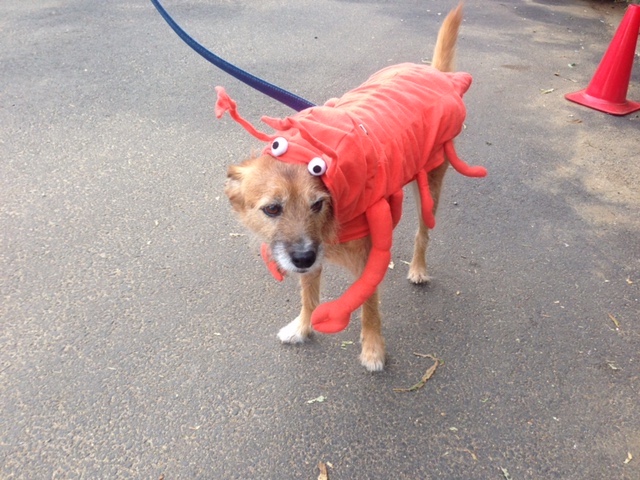
ADOPTING A BETTER ATTITUDE

Full disclosure. I am an animal rescue diehard.
I adopted my terrier-mix, Kenyon, from a pound thirteen years ago. Okay, fuller disclosure. If I had my ingredients written on my side like a can of soup, Judgmental would be, if not first, then definitely right behind Self-righteous (and considerably ahead of marzipan and riboflavin). The point is that I’ve always held a silent grudge against anyone who has a dog they’ve bought from a pet shop or breeder. Here, in Los Angeles, there are thousands and thousands of animals in shelters who, if they’re lucky, will get adopted and have a permanent home. If they’re not they’ll continue to wither away there or worse, be euthanized.
At the dog park I go to, my estimate is that about 70% of the canines are adopted. The other 30% are from breeders or pet stores. It’s not like I’m an umpire carrying a balls and strikes counter in my palm that I click every time I examine a dog and ask the owner a few questions, but I enjoy guessing things and so I stand by my numbers. Since I’m a regular at the park, I know the names of pretty much every dog and every person who shows up.
There’s the young two-legged woman who adopted an old three-legged pit bull. There’s the really tall guy in the Jeep with three Dobermans – all of whom I’d assumed he’d purchased from a breeder but, after chatting with him, learned that each of the trio was not only adopted BUT came with considerable baggage, both physical (a severe foot injury that nearly required amputation) and psychological. (It took me two months of cajoling before the brown one, Teddy, would even let me pet him.) There’s the Latino woman who found a skittish dog in Koreatown, named him Calvin and then two months later, had a major epiphany from God and changed his named to Merlin. And then there’s Meg, a sixty-something Australian with a standard poodle, Gigi, who she got from a breeder.
The first three owners I regard as saints, landing at the top of the good human pyramid. In my view, they are better people than me. They took more of a chance, taking on a dog that had a glaring handicap, an older dog, multiple dogs, or a dog that required medication to function. I just have one healthy well-adjusted twenty-five pound mutt. However, after learning of her dog’s origins, I immediately had issues with Gigi’s owner. My inner dialogue went as follows:
“Why did she BUY a dog?!?! She’s just helping to keep these breeders in business! Why not spring a dog from a veritable prison who will appreciate the new life he’s received, an animal who won’t be cookie-cutter in looks, personality and so overbred it’ll have hip dysplasia within a year? An animal who would happily write you a thank you note every day of your life if he/she had opposable thumbs and could spell. This woman could have gone to one of the dozens and dozens of shelters and taken in any of the amazing dogs living in tiny cages on slabs of concrete and if she REALLY HAD TO HAVE a poodle or any other specific type of dog, there are poodle rescues out there and my neighbor – who is kind of a jerk, which I attribute to Aspergers, but I have no proof — has two beautiful purebred Great Danes, both of whom he found at rescues. What a horrible, lazy, self-centered woman who I’m now condemned to be around four times a week because our dogs are on the same schedule!!!” At least that’s what I thought. What I said was “New collar? Nice.” I’m not a monster.
Now, by nature, I can be quite chatty and curious and prone to toss out quite a few questions. Although I probably saw Meg an average of three or four times a week at the park, I seemed to know everything about her except why she bought a dog. So I politely asked her why she had a poodle. I expected the answer to be the standard “I saw a picture of him online and he was adorable” or “The breeder just had puppies” or “I needed a dog that was hypoallergenic and I couldn’t find one at the pound.” It wasn’t.
It turns out that her father had fought for Australia in World War II. While battling the Nazis in North Africa he was captured and sent to a POW camp in Italy. After three and a half years in captivity, he escaped and wound up in Switzerland where he was billeted by a Swiss family. The Swiss family had… drum roll, please… a pair of standard poodles! These poodles gave comfort to the war hero and symbolized hope and he fell in love with them. (Side note: Poodles aren’t as fluffy and timid as one thinks. They can be fierce protectors and really should consider hiring a PR person to get out this news.)
Years later in 1994, after her father had passed away, Meg traveled to Switzerland to meet the couple who had taken in her dad. They were now elderly and yet they still had… a pair of standard poodles! (Yes, I know. Those weren’t the same poodles as the ones from 1942.)
Thus, a poodle reminds Meg of her father surviving the war (had he not, she wouldn’t have existed), of the kind people who took him in, and of being safe. Oh, and it turns out that she didn’t go to a poodle rescue because she hadn’t realized such a thing existed. I would say I owe her an apology but she has no idea of my feelings since I never articulated them. However, I have apologized to her internally.
Ranking people solely based on how and where they got their dogs can be a dangerous hobby. I need to stop feeling inferior (to the three-legged pit bull adopter) or superior (to the overwhelmed guy with the overweight lab from the overpriced breeder). Because when you break it down, in reality we’re all just kidnapping animals who are being nice to us because we’re a much more reliable source of meals than running around on the street, mountains or woods scrounging for a loose rabbit ear. Where you got your dog doesn’t make you a good or bad person. How you treat your dog determines that. So be nice to your pets and I’ll try to improve my attitude – because when people call me judgmental it starts a Möbius strip of hypocrisy where they’re simultaneous being judgmental by judging me and, frankly, our time is better spent talking to people and discovering their personal dog-human bonding stories. By next weekend I hope to be 30% less judgmental about the selfish abominations that don’t tie up their poop bags.
Brian Frazer is a boy with a dog





